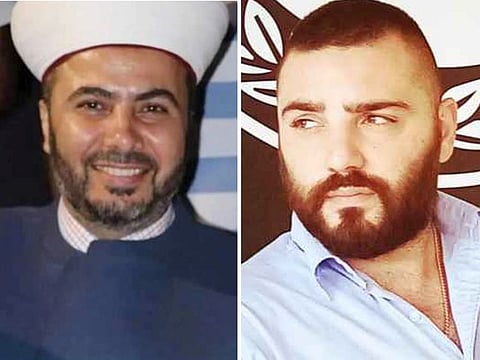As the world looks elsewhere, two deaths rock Lebanon
Hezbollah ally Lahhoud and Sunni cleric and Hezbollah critic Al Rifaii found dead

Beirut: Had it not been for their political affiliations, then the deaths of Elie Lahhoud and Ahmad Al Rifaii would have gone by largely unnoticed. One is an ally of Hezbollah, however, and another is a critic, giving both crimes a political flavour.
As the world was occupied with the massive earthquake that struck Turkey and Syria on February 6, two controversial deaths have taken in place in Lebanon, putting the bankrupt Mediterranean country on the verge of a sectarian outburst.
One was that of Ellie Lahhoud, a Maronite Christian ally of Hezbollah, who was found dead at a church in Mount Lebanon on February 7.
Two weeks later, it was announced that Sheikh Ahmad Al Rifaii, a Sunni critic of Hezbollah, went missing, only to be found dead in the governorate of Akkar on February 26.
Lahhoud’s friends have blamed his murder on the Lebanese Forces of Samir Gagegea, a ranking opponent of Hezbollah and Iran. Al Rifaii’s friends have blamed his murder on Hezbollah, calling on people to carry arms and take to the streets.
Had it not for their political affiliation, then both cases would not have gone past local headlines, since neither was known at a national level beyond their respective constituencies although both have appeared on local television talk-shows.
Lahhoud’s suicide
Elie Lahhoud often referred to himself as “president” of a tiny political party called Qawem (Resist), echoing the official line of Hezbollah. He hails from the same Maromite family as former president Emille Lahhoud, who also supported Hezbollah.
He was found dead at the Mar Elias Church in Mteileb, Metn on February 7. Most media outlets were too busy with the Turkish earthquake that struck 24-hours earlier to pick up the news, and his death went by relatively unnoticed.
Lahhoud’s body was seated on a bench, with a pistol next to him. Given his Hezbollah connection and the fact that he was killed in a church, it was easy to politicise his case and blame it on Samir Gegegea, who was arrested in 1994 over the bombing of a church on a Sunday Mass.
CCTV footage and further investigations proved that Gagegea had nothing to do with Lahhoud’s death, which was officially proclaimed a suicide due to accumulated financial debt. Gagegea’s Lebanese Forces (LF) have since filled lawsuits against a handful of bloggers and pro-Hezbollah account holders on Twitter and Facebook, accusing them of defamation.
Al Rifaii’s death: A kidnap-turned-murder
Sheikh Ahmad Al Rifaii stood on the opposite end of the political spectrum, making a name for himself as mosque imam in his native village of Qarqaf, whose Friday sermons were filled with anti-Hezbollah rhetoric. On Sunday February 26, his body was found buried 3-meters deep in Akkar, the northmost governorate of Lebanon, five days after being reported missing by his family.
The announcement triggered hate speech by Sunnis and Shiites on social media networks, prompting Akkar’s mufti Zeid Zakariya to call for calm and ask people “to stop listening to rumours.”
Speaking to local Lebanese media, his wife said that he received no death threats and had never suffered any security problems before. Four of his relatives were subsequently arrested, and two have confessed to killing him, citing “family problems.”
Among those abducted by Lebanese security is Yehia Al Rifaii, head of Qarqaf’s local municipality and owner of the Andalus School in Akkar. When security forces searched his school, they found a stockpile of weapons in its basement. His two sons, Mohammad and Ali, have since been arrested as well.
On February 26, Hezbollah paid its respect to Ahmad Al Rifaii’s family, denying any responsibility for his murder.
An unconnected third crime
On the very same day as the discovery of Ahmad Al Rifaii’s body, a young Christian named Michel Makhoul was kidnapped at 4:30pm in the town of Zahle in the Bekka Valley, not far from Syrian-Lebanese borders.
The kidnappers also took his Mercedes Benz G-Class, but were eventually apprehended by Lebanese security in an ambush later that same day. One of the kidnappers killed was identified as a Syrian refugee, who was killed in the ambush.
Although Makhoul’s case is seemingly unrelated with the kidnapping of Ahmad Al Rifaii and the death of Elie Lahhoud, it reveals how fragile security has become in Lebanon. The country has been without a president since Michel Aoun’s tenure ended on October 30 last. Its prime minister Najib Mikati is dubbing as acting premier and acting president, with no constitutional powers to take fundamental decisions on key state-related issues, including security.
Since October 2019, Lebanon’s economic crisis has left thousands in financial ruin. Hyperinflation and unemployment, along with sharp reduction in the value of the Lebanese lira, have sparked an increase in crime throughout the country. Since late 2022, Lebanon has also witnessed a series of bank robberies, with depositors resorting to arms in order to relieve their locked accounts. In mid-February, several banks were torched in Beirut.



